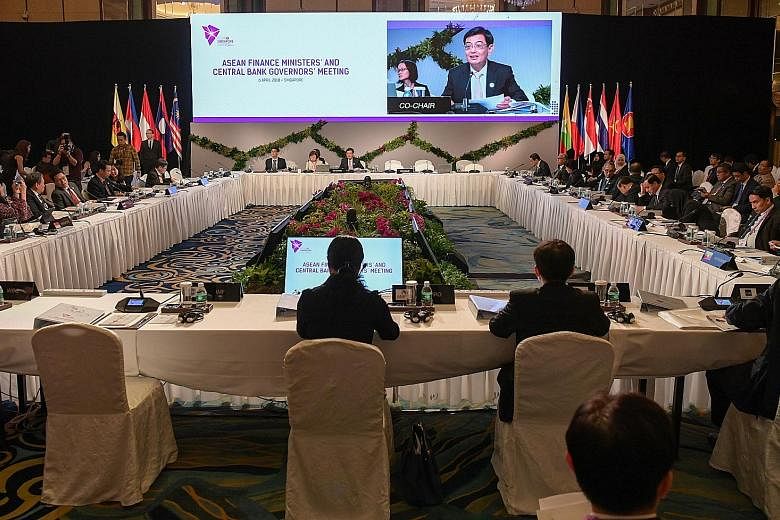Amid simmering trade tensions, Asean must keep its borders open, so the region can reach its full potential as a trade bloc, Finance Minister Heng Swee Keat said.
Wrapping up a meeting of Asean finance ministers and central bank governors this week in Singapore, Mr Heng told the media that while it was too early to revise growth projections for Asean, the members had "spent quite a bit of time discussing trade matters".
"To realise Asean's full potential, we appreciate the need to further integrate our economies," he said at a joint press conference with his counterparts from the Philippines and Thailand.
Singapore is the current chair of Asean, which is expected to grow at a brisker pace than most other regions this year, after posting a growth of just over 5 per cent last year.
Mr Heng noted that globalisation has lifted millions out of poverty, but also negatively affected certain segments. Asean members would need to find ways to integrate their economies, while simultaneously making structural changes to improve financial connectivity for the region and developing their people's skills.
"We need to send a strong signal that trade tensions, if they escalate into something worse, will not benefit anyone.
"We must continue to have very strong commitment to trade and to openness to the globalisation process," he said.
This also comes as Asean members will hold meetings next month with China, Japan and South Korea at the Asean+3 forum.
Mr Heng noted that financial technology, or fintech, will be a linchpin of Asean cooperation, as it can lower costs significantly to foster financial inclusion.
Monetary Authority of Singapore managing director Ravi Menon told reporters that mobile devices can play an important role in bringing basic banking, insurance and payment services to underserved markets in Asean.
Philippine central bank governor Nestor Espenilla Jr noted that fintech innovation such as in credit scoring and simple payments offers new solutions that traditional banking methods could not provide.
Bank of Thailand governor Veerathai Santiprabhob pointed out that Thai banks have not charged transfer fees for the inter-bank transfer service known as PromptPay, as fees for such digital retail payments are significantly lower.
There are now about 30 million PromptPay users.
Thailand plans to link PromptPay with Singapore's version of real-time fund transfer, known as PayNow.
Mr Menon said that business leaders have also made a strong pitch that regulators should facilitate the use of fintech.
Separately, the Asean Bankers Association said the Asean Financial Innovation Network (AFIN) is set to pilot its platform by the fourth quarter of this year. AFIN represents a regional network that aims to match Asean financial institutions with fintech firms to develop solutions to spur financial inclusion in the region.
The areas of focus for Asean this year will also include sustaining growth, which is centred on infrastructure financing.
The Asian Development Bank estimates that between 2016 and 2030, Asean's infrastructure investment needs will total US$2.8 trillion (S$3.7 trillion).

